America Competes Reauthorization Fosters Nanomanufacturing Research, Innovation, and Public-Private Partnerships
 The America Creating Opportunities to Meaningfully Promote Excellence in Technology, Education, and Science (COMPETES) Reauthorization Act of 2010 (America Competes Act -H.R. 5116) recently signed into law has extended the oversight activities of several government agencies to coordinate appropriations and expenditures made in several areas aimed to bolster U.S. competitiveness in science and technology. In assigning these oversight activities to specific agencies under the coordination of an interagency committee within the National Science and Technology Council (NSTC) established by the Director of the Office of Science and Technology Policy (OSTP), strategies and roadmaps will be established in areas including science education, advanced manufacturing, innovation, and effective technology transfer. The cornerstones of this will include a coordinated strategy on Science, Technology, Engineering, Mathematics (STEM) education; the establishment of national goals and priorities in advanced manufacturing; identification and reduction of regulatory, logistical, and fiscal barriers that inhibit manufacturing; effectively facilitating technology transfer of federally supported research from academia to commercialization; identification of key challenges that may be addressed through public-private partnerships; and encouragement of such partnerships to address those challenges for transition to U.S. based manufacturing.
The America Creating Opportunities to Meaningfully Promote Excellence in Technology, Education, and Science (COMPETES) Reauthorization Act of 2010 (America Competes Act -H.R. 5116) recently signed into law has extended the oversight activities of several government agencies to coordinate appropriations and expenditures made in several areas aimed to bolster U.S. competitiveness in science and technology. In assigning these oversight activities to specific agencies under the coordination of an interagency committee within the National Science and Technology Council (NSTC) established by the Director of the Office of Science and Technology Policy (OSTP), strategies and roadmaps will be established in areas including science education, advanced manufacturing, innovation, and effective technology transfer. The cornerstones of this will include a coordinated strategy on Science, Technology, Engineering, Mathematics (STEM) education; the establishment of national goals and priorities in advanced manufacturing; identification and reduction of regulatory, logistical, and fiscal barriers that inhibit manufacturing; effectively facilitating technology transfer of federally supported research from academia to commercialization; identification of key challenges that may be addressed through public-private partnerships; and encouragement of such partnerships to address those challenges for transition to U.S. based manufacturing.
Regards,
Jeff Morse, Managing Director,
National Nanomanufacturing Network
Nanotechnology Education in the US
 There is a concerted effort underway to bolster education and training in nanotechnology in the US as an essential component of National Nanotechnology Initiative (NNI). To achieve substantial and lasting impact this activity necessarily reaches across all audience levels: K12, two-year college, four-year college, graduate degree level, professional, and public. Education and training is critically important to the National Nanomanufacturing Network (NNN) since a trained workforce is the key ingredient of a nation that leads through innovation and manufacturing. The direct link between education and a thriving national enterprise cannot be over emphasized. The recently passed reauthorization of the America Competes Act (H.R. 5116) underscores the importance of education programs in manufacturing, innovation, and entrepreneurship, as a complement to the vital science technology education and mathematics (STEM) educational activities. To be thoroughly effective, impacting both jobs and the economy, these programs need to be guided with a close partnership between educational institutions, industry, and government. Alongside the Subcommittee on Nanoscale Science, Engineering and Technology (NSET) that has guided the NNI for the last ten years, the new Interagency Working Group on Manufacturing Research and Development coordinated by National Science and Technology Council of the Office of Science and Technology Policy in the White House can play an important leadership role. More....
There is a concerted effort underway to bolster education and training in nanotechnology in the US as an essential component of National Nanotechnology Initiative (NNI). To achieve substantial and lasting impact this activity necessarily reaches across all audience levels: K12, two-year college, four-year college, graduate degree level, professional, and public. Education and training is critically important to the National Nanomanufacturing Network (NNN) since a trained workforce is the key ingredient of a nation that leads through innovation and manufacturing. The direct link between education and a thriving national enterprise cannot be over emphasized. The recently passed reauthorization of the America Competes Act (H.R. 5116) underscores the importance of education programs in manufacturing, innovation, and entrepreneurship, as a complement to the vital science technology education and mathematics (STEM) educational activities. To be thoroughly effective, impacting both jobs and the economy, these programs need to be guided with a close partnership between educational institutions, industry, and government. Alongside the Subcommittee on Nanoscale Science, Engineering and Technology (NSET) that has guided the NNI for the last ten years, the new Interagency Working Group on Manufacturing Research and Development coordinated by National Science and Technology Council of the Office of Science and Technology Policy in the White House can play an important leadership role. More....
Dielectrophoretic Alignment of High Density Carbon Nanotube Arrays
 Devices and processes exploiting the properties of carbon nanotubes (CNT) continue to experience notable progress towards applications including transistors, flexible electronics, displays, and sensors. While individual single walled nanotubes (SWNT) exhibit superior transport properties for transistor applications, the ability to control chirality results in large device-to-device performance inhomogeneities. As a result approaches to fabricate CNT transistors have utilized random networks or multilayers of mostly semiconducting SWNTs. While these approaches have shown to provide homogeneous devices characteristics over large areas while enabling current outputs, charge transport limitations are incurred due to tube-tube junctions within the conduction path. Ultimately such devices could benefit from perfectly aligned two-dimensional (2D) arrays of SWNTs, thereby exhibiting electronic properties approaching the intrinsic properties of the individual nanotubes. More....
Devices and processes exploiting the properties of carbon nanotubes (CNT) continue to experience notable progress towards applications including transistors, flexible electronics, displays, and sensors. While individual single walled nanotubes (SWNT) exhibit superior transport properties for transistor applications, the ability to control chirality results in large device-to-device performance inhomogeneities. As a result approaches to fabricate CNT transistors have utilized random networks or multilayers of mostly semiconducting SWNTs. While these approaches have shown to provide homogeneous devices characteristics over large areas while enabling current outputs, charge transport limitations are incurred due to tube-tube junctions within the conduction path. Ultimately such devices could benefit from perfectly aligned two-dimensional (2D) arrays of SWNTs, thereby exhibiting electronic properties approaching the intrinsic properties of the individual nanotubes. More....
NanoBusiness Alliance Interview with Mihail Roco
 This month, the NanoBusiness Alliance's Steve Waite talked to Mihail 'Mike' Roco. Dr. Roco proposed the National Nanotechnology Initiative (NNI) on March 11, 1999, at the White House, and is a key architect of the NNI. He is Senior Advisor for Nanotechnology to the National Science Foundation (NSF), and the founding chair of the U.S. National Science and Technology Council's Subcommittee on Nanoscale Science, Engineering and Technology (NSTC/NSET). Dr. Roco has been an international leader of nanotechnology development and of converging new technologies and initiated the first U.S. federal government program that focused on nanoscale science and engineering at NSF in 1991. In 2007, he was recognized with the National Materials Advancement Award from the Federation of Materials Societies "as the individual most responsible for support and investment in nanotechnology by government, industry, and academia worldwide." More....
This month, the NanoBusiness Alliance's Steve Waite talked to Mihail 'Mike' Roco. Dr. Roco proposed the National Nanotechnology Initiative (NNI) on March 11, 1999, at the White House, and is a key architect of the NNI. He is Senior Advisor for Nanotechnology to the National Science Foundation (NSF), and the founding chair of the U.S. National Science and Technology Council's Subcommittee on Nanoscale Science, Engineering and Technology (NSTC/NSET). Dr. Roco has been an international leader of nanotechnology development and of converging new technologies and initiated the first U.S. federal government program that focused on nanoscale science and engineering at NSF in 1991. In 2007, he was recognized with the National Materials Advancement Award from the Federation of Materials Societies "as the individual most responsible for support and investment in nanotechnology by government, industry, and academia worldwide." More....
Comments